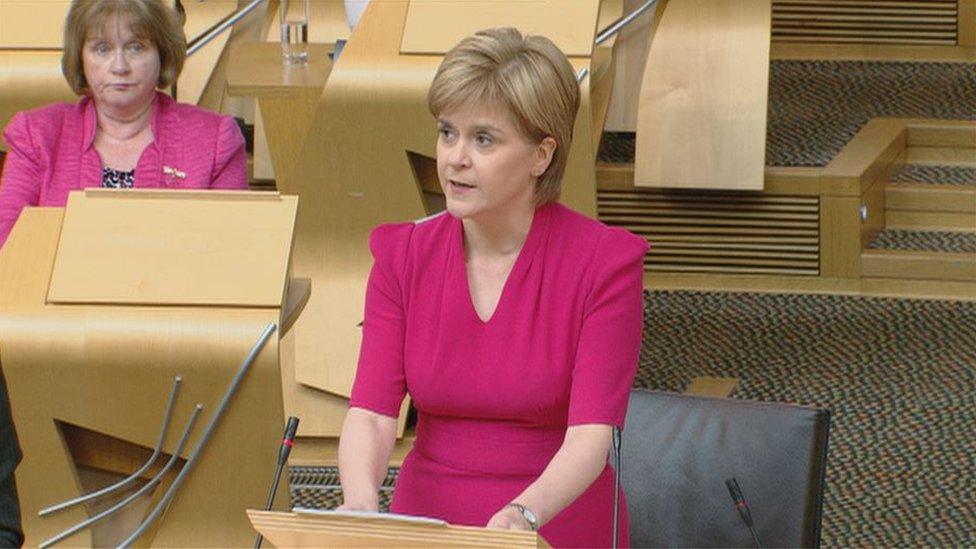Nicola Sturgeon puts education to the top of the class
- Published
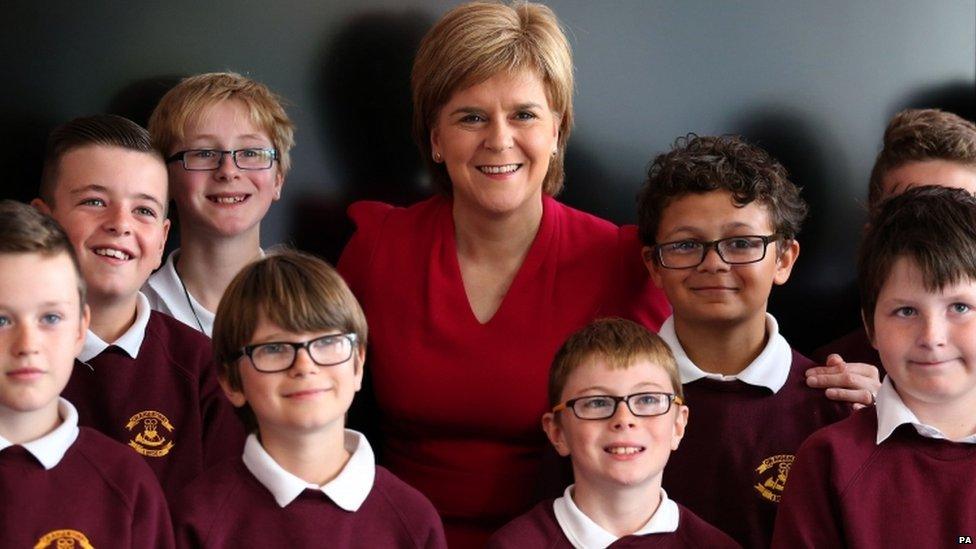
First Minister Nicola Sturgeon meets pupils taking part in active maths and active literacy lessons at Craigentinny Primary School in Edinburgh
Out of the mouths, eh? Nicola Sturgeon was visiting an Edinburgh primary school as a prelude to elevating education to the top of the class in her new Programme for Government.
The first minister displayed a commendable dexterity with sums, helped a young lad with sentence construction (for which he appeared genuinely grateful) and then faced a few questions of her own.
Was it difficult, asked another youngster, to wield control over Scotland? You know, with all the politics and things?
Ms Sturgeon conceded that such a task had its sticky moments before recalling that "control" was scarcely the mot juste in these resolutely democratic days.
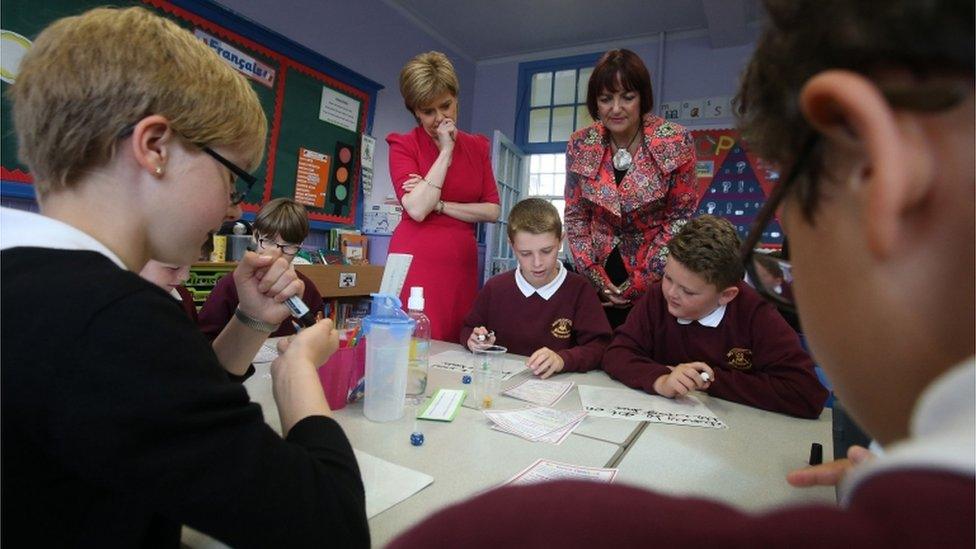
Her aim, she assured the inquiring child, was to work with the good and sensible people of Scotland.
Then came another. What were the FM's views on the Labour Party, positive and negative?
The downside? According to Ms Sturgeon, her opponents had rather lost their way. And that upside? They had been around a fair while. Seldom was praise more faint.
I mention these matters because there is a decidedly political core to today's programme - as there is, of course, for most parliamentary announcements. That core is somewhat burnished by the relative proximity of the next Holyrood elections.
However, the FM's focus went beyond that.
She issued declarations of intent for what might be done with powers which have yet to be devolved to Scotland - including powers which would fall to be tackled by the next parliament. For example, she signalled that she would want to begin the task of cutting Air Passenger Duty from 2018.
Nicola Sturgeon outlines plans for new pupil assessments aimed at improving attainment in Scotland's schools
On welfare, she indicated that it would be her intention to assist, where possible, groups such as carers, disabled people and those seeking work. The so-called "bedroom tax" would be scrapped.
The political strategy is not difficult to discern. It is, in essence, the twin track pursued by Ms Sturgeon and her predecessor.
Chide Westminster for the paucity of their plans in transferring new powers to Scotland. But, simultaneously, offer to make the best of such powers as are devolved.
The latter element is designed to match the mood of the Scottish people. They understand and may even applaud the purpose of protest. But they also want their elected tribunes to act in their interests: to make things better even if they are prevented from attaining the best, as they see it.
So, in that sense, promises to act on future powers are at least partly designed to win support in the here and now, from voters who will go to the polls in May next year.
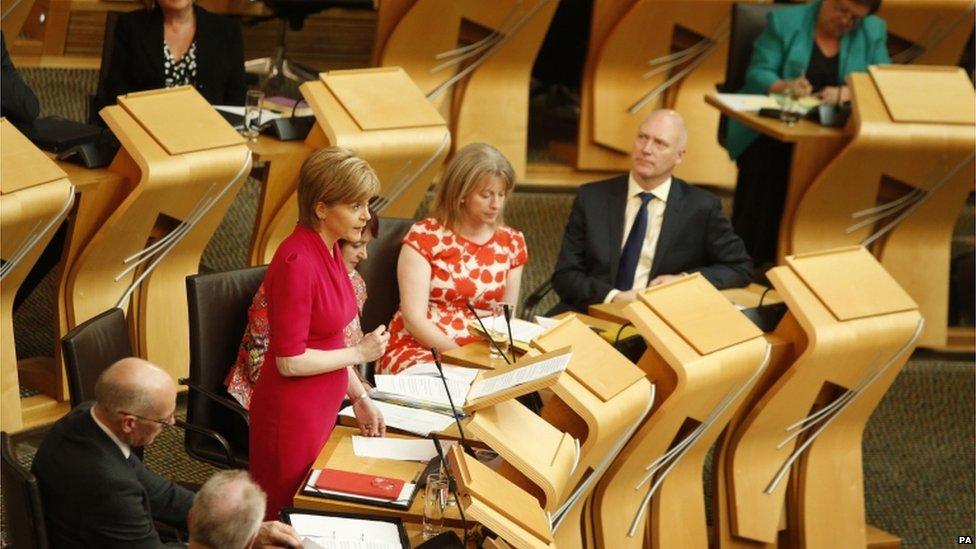
Equally, the strategy operated by opposition leaders is palpable. They want to constrain Ms Sturgeon to focus upon immediate challenges, deploying immediately available powers - while simultaneously supporting further devolution, inviting voters to accept it as a given.
So Ruth Davidson of the Tories challenges Ms Sturgeon to stick to the day job. Kezia Dugdale for Labour says it is a scandal that pupils from poorer backgrounds are - right now - leaving school ill-equipped with the basics. Willie Rennie of the Liberal Democrats says that ministers have neglected the impact of changes to policing.
And what about taxation? Ms Sturgeon confirmed that, as required by statute, her government would feature a Scottish rate of income tax in the Budget Bill which will set out fiscal plans for 2016/17. That bill will emerge at the end of this year or early next.
The process works like this. The Treasury withholds the equivalent of 10p of income tax in funding. It is then up to Holyrood to reinstate that sum - or to levy more, or less.
What might the Scottish Government do? That is not yet finalised. It depends on the sums available from the Treasury.
However, it is my reading that ministers, including the Finance Secretary John Swinney, do not approach this task with any zest for increasing income taxation. For two reasons. One, it might be thought to clash with the notable emphasis upon business growth featured in the FM's statement.
Secondly, those elections. The same John Swinney recalls promoting a Penny for Scotland increase in income tax when the Scottish Parliament was first elected. He also recalls the outcome of those elections. (Hint: Donald Dewar became First Minister.)
Fiscal framework
Now, to stress, this decision has not been taken. And there will be those within the SNP - and other parties - who will argue that Scotland should increase income tax to generate productive expenditure. They will argue that it is misreading Penny for Scotland to say it was electorally unpopular.
All I am saying is that I do not believe an increase in basic rate income tax to be the starting point for Ms Sturgeon or Mr Swinney.
There is another element here. Negotiations have been under way for some time with regard to the fiscal framework which will determine cross-border funding when new powers over taxation are transferred.
Scottish government sources suggest those talks are not going all that wonderfully - at least from a Holyrood perspective. There is talk of the Treasury "playing hardball". (It is in truth the only game the Treasury knows - although cynics might cite Risk or even, in a darker mood, Twister.)
The particular concern appears to centre upon capital spending - and depredations thereon. That is why Nicola Sturgeon told MSPs she hoped Holyrood would sign-off on additional new powers by March 2016 - but only if the deal was "fair" for Scotland.
The Treasury, of course, may have an alternative interpretation of fairness: one that takes account of the wider UK, from their perspective. This one has a way to run.
- Published2 September 2015
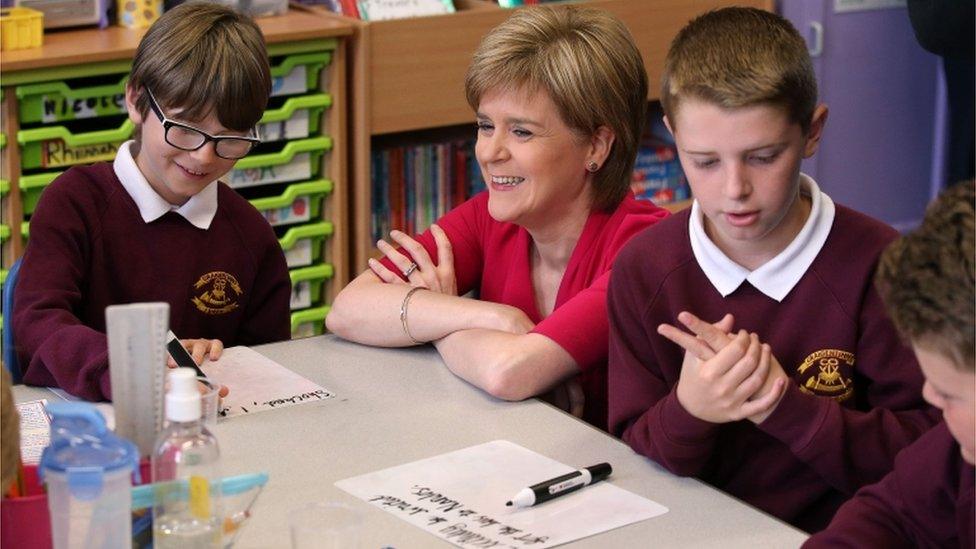
- Published1 September 2015
